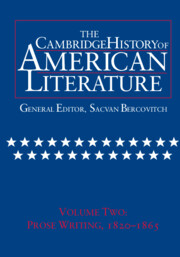1 - Beginnings of Professionalism
from CONDITIONS OF LITERARY VOCATION
Published online by Cambridge University Press: 28 March 2008
Summary
In American Renaissance: Art and Expression in the Age of Emerson and Whitman, his seminal 1941 study of classic American writing, F. O. Matthiessen located the “renaissance” of his title in the 1850s, when Emerson, Whitman, Thoreau, Hawthorne, and Melville were all publishing major works. One might locate an earlier American renaissance (or “naissance”) at the beginning of the 1820s, when three writers who would come to dominate American literature during the next two or three decades published their first important books. Washington Irving's The Sketch Book of Geoffrey Crayon, Gent, was issued in installments, by C. S. Van Winkle of New York City, beginning in June 1819 and running through September 1820. In September 1821, Hilliard and Metcalf, of Cambridge, Massachusetts, issued the first volume of Poems by William Cullen Bryant. Three months later, in New York City, Charles Wiley issued James Fenimore Cooper's The Spy. The earth did not, perhaps, shake at the time, but from the perspective of literary history the appearance of these three books within a little less than three years seems momentous. The careers of these writers would testify to a major change in the meaning of both literature and literary vocation in America — a change that affected almost all of their literary contemporaries.
- Type
- Chapter
- Information
- The Cambridge History of American Literature , pp. 9 - 73Publisher: Cambridge University PressPrint publication year: 1995

